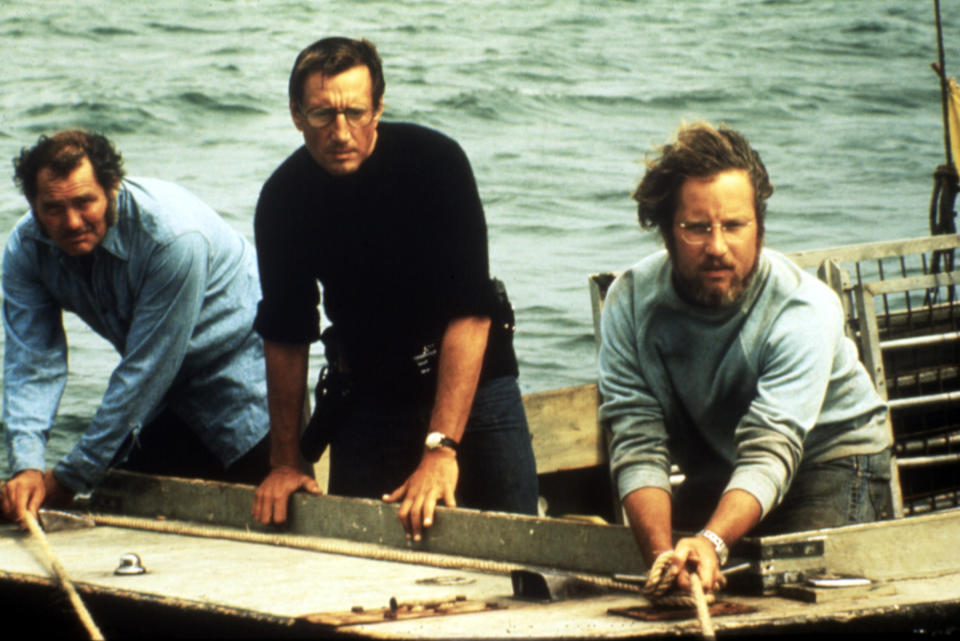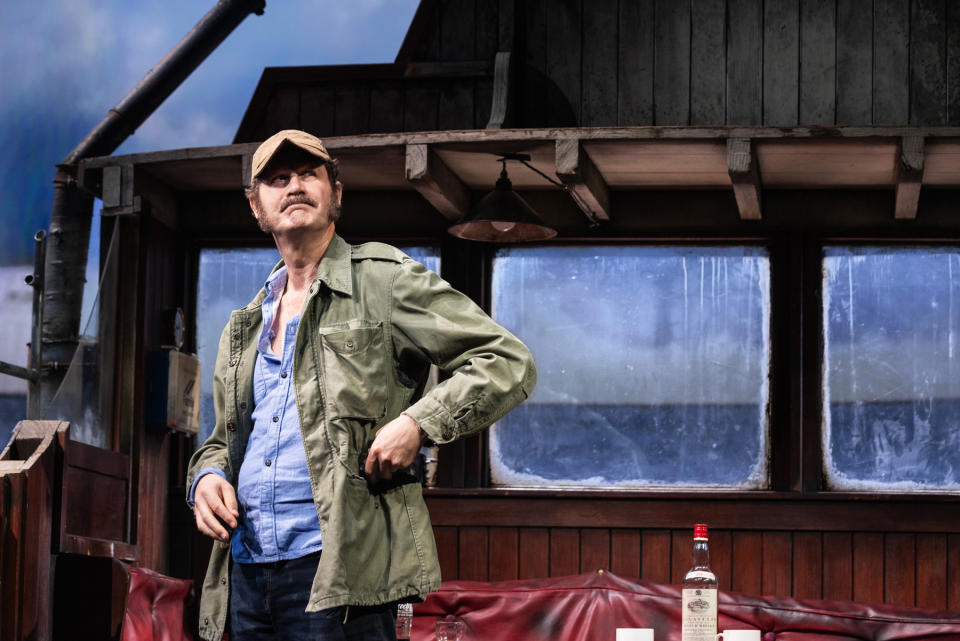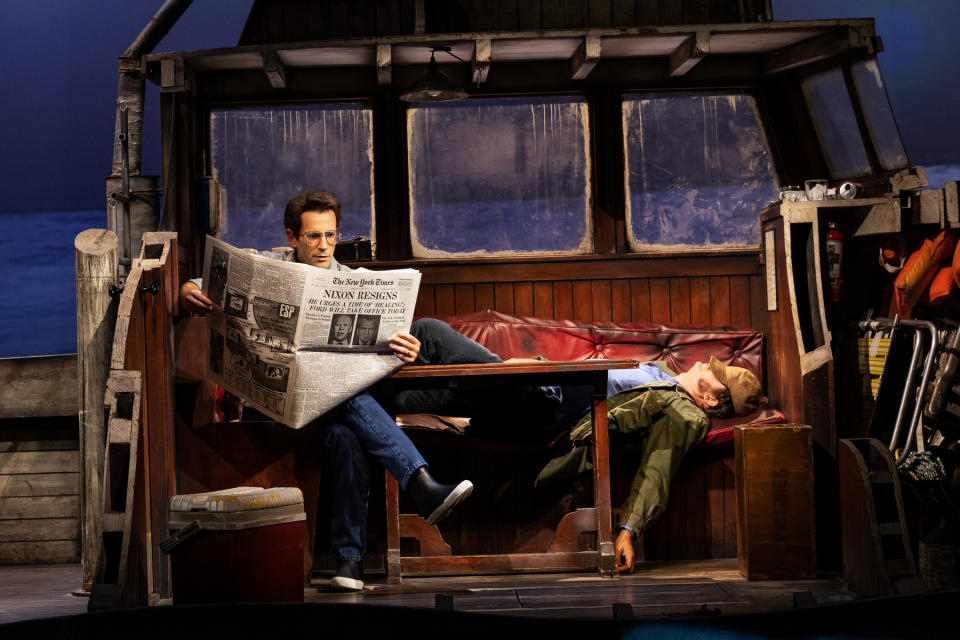Inside ‘The Shark Is Broken,’ the Meta Play About the Making of ‘Jaws’
- Oops!Something went wrong.Please try again later.
- Oops!Something went wrong.Please try again later.
- Oops!Something went wrong.Please try again later.

Stop us if you’ve heard this one before: A man goes to make a movie about a shark.
He decides to shoot on the ocean instead of a tank on a soundstage, to give it that extra sense of realism. Virtually everything that can go wrong does go wrong, including the fact that the main mechanical shark built by the special-effects team has a nagging tendency to either sink or simply not work. The crew nearly mutinies. The locals become hostile. The shoot goes over-schedule and over-budget. The consensus is that it’s a catastrophe in the making. The end result becomes a massive hit and kicks off the blockbuster era.
More from Rolling Stone
Why 'Winter Kills' Is the Perfect Conspiracy Thriller for the QAnon Era
'The Last Voyage of the Demeter' Is a Vampire 'Master and Commander'
The 'Back to the Future' Musical (Mostly) Cuts Marty's Appropriation of Chuck Berry
In the middle of all of this are three men and a boat. One of them, Roy Scheider, is a reliable, mid-career character actor, albeit one with an Oscar nomination on his resumé thanks to The French Connection. Another, Richard Dreyfuss, is a young up-and-comer who was part of the American Graffiti ensemble and hopes that having a lead role in an upcoming coming-of-age movie (The Apprenticeship of Duddy Kravitz) will indeed lead to bigger things.
And the last of this trinity is Robert Shaw — the highly esteemed British graduate of the Royal Academy of Dramatic Art, novelist, playwright, award-winner, popular TV swashbuckler (The Buccaneers), pal and primo interpreter of Harold Pinter, and a performer who’d played everything from Shakespearean heroes to Bond villains. He was easily the most famous person on set and, next to the shark, the most temperamental.
No stranger to mainstream moviemaking — he was, after all, the bad guy in both The Sting and The Taking of Pelham One Two Three — Shaw has signed up to play Quint, the film’s in-house Ahab, because he could use the money. Plus, his wife Mary Ure, also an esteemed actor, and his assistant would like a summer spent on Martha’s Vineyard. Still, he’d rather be concentrating on his writing than sitting around waiting for a perpetually defective robot shark to work. So, Shaw spends the plentiful down time by drinking, and needling his neurotic costar Dreyfuss, and bonding with his fellow prisoners aboard their floating jail, and playing games, and drinking, and trying to get this damn speech about the USS Indianapolis into workable shape, and drinking some more.

The Shark Is Broken details the legendary behind-the-scenes tale of how Steven Spielberg’s Jaws somehow managed to overcome one major mishap after another and snatch box-office victory from the you-know-what of defeat. But the play, which opened its first Broadway run on August 10th, revisits the wobbly making of this classic from the perspective of its three stars. And here’s where things get tricky, and more than a little Freudian.
Because like the original production at the 2019 Edinburgh Fringe Festival, its 2021 run in London’s West End and its North American in premiere in Toronto last year, the Broadway version features Ian Shaw, the play’s co-writer and the actor’s son, portraying his dad. To say that this bit of casting introduces a whole other psychological layer to what’s happening onstage, especially when the younger Shaw leans in to the less-than-flattering aspects of the elder Shaw, is to state the obvious. But it also gives the play an unusual sense of pathos, and turns what could have been one giant film-nerd in-joke into a highly personal reflection upon father issues (both within and outside of the text), acting, masculinity, generational divides, and how to process deep-seated trauma. The shark isn’t the only thing that’s broken here.
“I’ve said this is really five levels of meta,” says Guy Masterson, the director of all four productions. “You’ve got three actors playing scenes from Jaws, while playing three actors who were in Jaws, one of whom is playing his dad who was in Jaws, while also telling the story of the making of Jaws itself. It’s a bit of a headfuck.”
“In lesser hands, this could have been such a vanity project or just a lot of jokes about a famous movie shoot,” Alex Brightman, who plays Dreyfuss, says. “And it’s the exact opposite of those things. It feels like it’s got a lot more going beneath the surface.”

Everyone probably remembers the first time they saw Jaws and/or heard John Williams’ predatory two-note motif for the score. Shaw is one of the very few whose earliest memories involve seeing the shark up close while visiting his dad on set. When Robert Shaw passed away in 1978, Ian was around eight years old; he credits a drama teacher at school, rather than his mother and father’s success in show business, for making him want to become an actor around that same period. “There was never any sense that I was picking up a baton, if that’s what you’re asking,” Shaw says, when the coincidental timing is pointed out. “It was something I’d already decided I wanted to devote myself to.”
Still, though Ian says that comparisons to his dad whenever he’d go into auditions or book roles “happened way less than you’d think,” he was the son of a legendary star of stage and screen, who bore a strong resemblance to him. (“Because of his looks,” Masterson, who’s known Ian for 25 years, notes, “when he walked into a room, I think people did sort of expect ‘Robert Shaw.'”) His surname was just his surname, something he neither banked on nor hid from. He was proud of his lineage yet determined to forge his own path. “Shaw” was simply how he referred to father. There was no sense of some imaginary “Jr.” being affixed to his name or shadowing his screen persona.
Then, Ian says, a few odd things happened in a relatively short period of time. He auditioned for a production of Hamlet that Richard Dreyfuss happened to be directing. “When I went up to introduce myself to him, I mentioned that I was Robert’s son,” he recalls. “And he went pale and sort of walked away. I’d felt like I’d never made such a horrible first impression on somebody. Then I went back and read [screenwriter Carl Gottlieb’s book] The Jaws Log again and it came flooding back: Oh, right, they had a terrible time making this! You’d think with all that chemistry onscreen that everyone was getting along wonderfully! So that made me go, Hmmm….”
Not long after that, Ian had grown a mustache for a role and, walking by a mirror one day, suddenly stopped in his tracks. “I thought, ‘Oh my god, it’s Quint,'” he says. “I realized I was around the same age as my dad when he played him, and with the facial hair, it was like Quint was staring back at me. And then I remembered that I’d played Colonel Paul Tibbets, the pilot of the Enola Gay, in this TV movie (2005’s Hiroshima), and I thought about the Indianapolis speech. ‘Just delivered the bomb… the Hiroshima bomb.‘ There was this weird moment where it was like, ‘My dad played the man who brought the atomic bomb to the Pacific. And then I was the one who dropped it.'”
Ian suddenly found himself wondering: Well, what if I did write something about my dad? “Because even though I never felt like I was in Shaw’s shadow as an actor, I did feel like I was running from him a bit,” he admits. “Maybe that would get rid of some baggage, so to speak. I sketched the story out, and then I immediately thought: This is a horrible idea. I’d have to talk about the alcoholism, and the bullying on set — not to mention that I would seem like a presumptuous prick for having the audacity to pretend that I was my father. So I shoved it in a drawer.
“Then I had a beer with some friends, I happened to mention it, they thought it was a really good idea … and I was kind of annoyed,” he says, laughing. “I was hoping they would shoot it down. Then my wife thought it was a good idea. Then my family thought it was a good idea. People couldn’t stop thinking this is a good idea. And finally I was like, ‘Well, fuck off, I’ll write it, then!'”
Ian enlisted an old friend, the writer Joseph Nixon, to help him flesh out a script “that wasn’t just something about me and my dad. I wanted it to be something a little more universal.” In addition to using Gottlieb’s book as a go-to source about the production, Ian began poring through old TV and print interviews his dad had given. “My sister Penny had saved everything, so I had access to all of that,” he says. “My father was remarkably candid when he talked to journalists and went on on TV. Like, really candid — not like what you would see now. So a lot of the lines in the play are taken from things he actually said about Jaws, acting, writing, drinking.”
Ah yes, the drinking. Ian had known that his father had an intense love-hate relationship with booze, and that he’d often try (and fail) to get sober. His sister also passed along Robert’s “drinking diary,” which was a log he kept that tracked how much he did or did not drink on any given day. “You’ll see a day or a week where it’s, ‘I drank nothing today — I only had water.’ And then there’s another day, a few pages later, where he fell off the wagon. It’s kind of heartbreaking. It made me see the struggle he had with alcohol. I felt like I understood something about him that I didn’t before.”

Ian called up Masterson, an actor-director who had staged a play about his uncle Richard Burton, Playing Burton. “We had become friends, he was very moved by the play, and we’d talked about the elephant in the room: the great actor relative in whose footsteps you attempt to follow,” Masterson says. “Ian has had it way worse than I had, since Robert was his father and my uncle was really more of a father figure to me. But we had that in common.”
When Ian told him about his idea, the director nearly fell out of his chair. “It’s one thing to do a play about your father, and another thing to do a play about fucking Jaws,” he laughs. “I said, “And so who’s gonna play your dad?’ He replied, ‘I thought I might…?’ When he asked if I’d direct it, I didn’t hesitate in saying yes. I knew how to protect him, if you like. I knew what Ian was going to go through. He wanted it to be warts and all, but the reality of being warts and all is: you have to deal with the warts.”
When it came time to mount the pre-Edinburgh premiere of The Shark Is Broken in Brighton, right before Ian had to walk out onstage as Shaw, he experienced what he characterizes as “the single worst feeling I’ve ever experienced in my entire life. It was, ‘What the fuck am I doing?’ I thought I was going to be in a car crash.” Then he stepped out, and what he called the “tics” of his dad’s performance as Quint (“a tilt of the head, a squint of the eyes”) suddenly turned into something almost transcendent.
“It wasn’t just that I’d probably been doing little mini-versions of my dad since I was a kid, around the time that he’d died,” Ian says. “I didn’t have to explore those things. It was that attitude of fearlessness that he had, which was something I’ve never had and was suddenly able to tap into. It was just so very liberating.”
Masterson had conceived The Shark Is Broken as a series of blackout sketches, due to the episodic nature of Shaw and Nixon’s script. After its run at the Fringe, they were asked to expand the production from 70 to 90 minutes for the London run. According to Masterson, they had a few scenes involving Dreyfuss that they had cut from the original; once they reinstated those, they began to make his character a more substantial part of the story. The director still felt like they needed to “rip it up” and push even further, however, so as they were preparing to mount the play on Broadway, he and Shaw re-examined the relationship between all three men. (Colin Donnell rounds out the New York cast as Scheider.) The result feels more like an even-handed look at the camaraderie, the conflict, and the common ground of dealing with abusive or absent patriarchs.
Yet it’s still very much Ian Shaw’s play, and still very much a way for him to connect to his dad, to try and understand Shaw’s demons, to pay homage to his talent, and to celebrate how three men on a boat survived endless days on the road to making a classic. It ends with Shaw doing a full recitation of the Indianapolis speech, which is meticulously recreated yet never, ever feels like it’s a wax-museum-with-a-pulse piece.
“I always loved my father,” Ian says. “Having played the role, I now appreciate him, what he did, and what he fought against a lot more. I really did think this play would end my modest career. And now, here I sit on Broadway, where both he and my mother acted. ”
He laughs. “It’s just mad.“
Best of Rolling Stone

